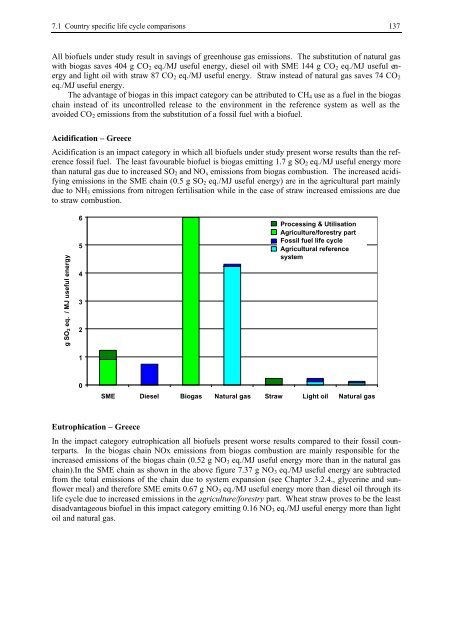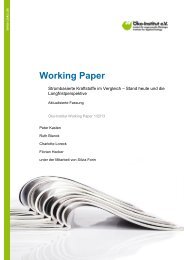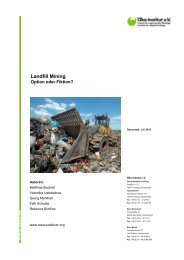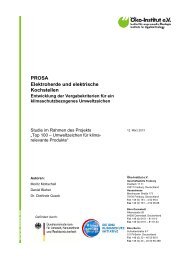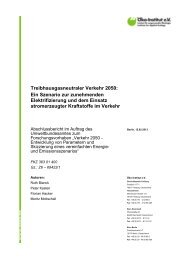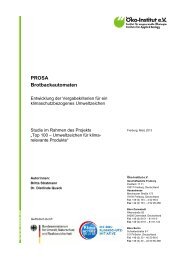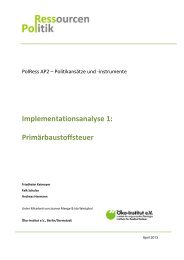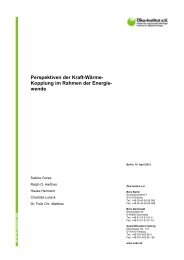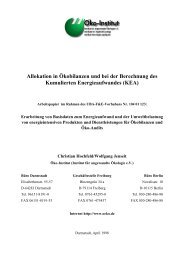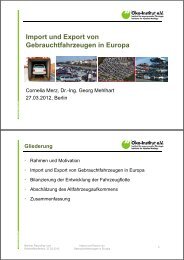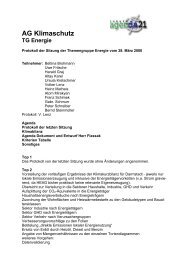BIOENERGY FOR EUROPE: WHICH ONES FIT BEST?
BIOENERGY FOR EUROPE: WHICH ONES FIT BEST?
BIOENERGY FOR EUROPE: WHICH ONES FIT BEST?
Create successful ePaper yourself
Turn your PDF publications into a flip-book with our unique Google optimized e-Paper software.
7.1 Country specific life cycle comparisons 137<br />
All biofuels under study result in savings of greenhouse gas emissions. The substitution of natural gas<br />
with biogas saves 404 g CO2 eq./MJ useful energy, diesel oil with SME 144 g CO2 eq./MJ useful energy<br />
and light oil with straw 87 CO2 eq./MJ useful energy. Straw instead of natural gas saves 74 CO2<br />
eq./MJ useful energy.<br />
The advantage of biogas in this impact category can be attributed to CH4 use as a fuel in the biogas<br />
chain instead of its uncontrolled release to the environment in the reference system as well as the<br />
avoided CO2 emissions from the substitution of a fossil fuel with a biofuel.<br />
Acidification – Greece<br />
Acidification is an impact category in which all biofuels under study present worse results than the reference<br />
fossil fuel. The least favourable biofuel is biogas emitting 1.7 g SO2 eq./MJ useful energy more<br />
than natural gas due to increased SO2 and NOx emissions from biogas combustion. The increased acidifying<br />
emissions in the SME chain (0.5 g SO2 eq./MJ useful energy) are in the agricultural part mainly<br />
due to NH3 emissions from nitrogen fertilisation while in the case of straw increased emissions are due<br />
to straw combustion.<br />
g SO2 eq. / MJ useful energy<br />
6<br />
5<br />
4<br />
3<br />
2<br />
1<br />
0<br />
Eutrophication – Greece<br />
Processing & Utilisation<br />
Agriculture/forestry part<br />
Fossil fuel life cycle<br />
Agricultural reference<br />
system<br />
SME Diesel Biogas Natural gas Straw Light oil Natural gas<br />
In the impact category eutrophication all biofuels present worse results compared to their fossil counterparts.<br />
In the biogas chain NOx emissions from biogas combustion are mainly responsible for the<br />
increased emissions of the biogas chain (0.52 g NO3 eq./MJ useful energy more than in the natural gas<br />
chain).In the SME chain as shown in the above figure 7.37 g NO3 eq./MJ useful energy are subtracted<br />
from the total emissions of the chain due to system expansion (see Chapter 3.2.4., glycerine and sunflower<br />
meal) and therefore SME emits 0.67 g NO3 eq./MJ useful energy more than diesel oil through its<br />
life cycle due to increased emissions in the agriculture/forestry part. Wheat straw proves to be the least<br />
disadvantageous biofuel in this impact category emitting 0.16 NO3 eq./MJ useful energy more than light<br />
oil and natural gas.


